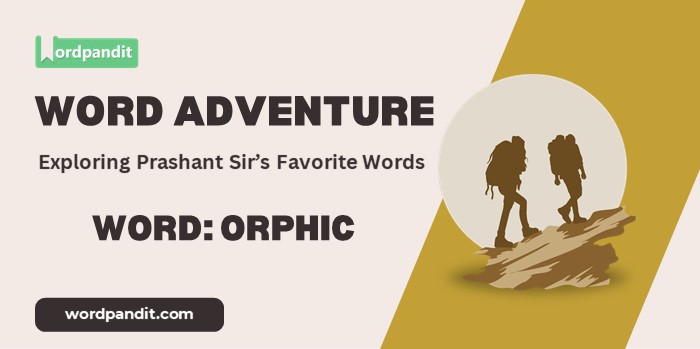Word Adventure: Orphic
The Headline
"Orphic: Unlocking the Mystic Melodies of Language"
The Scoop
In the grand symphony of the English language, some words resonate with a deeper, more mysterious tone. 'Orphic' is one such word – a term that carries with it the weight of ancient myths, the allure of secret knowledge, and the power of transformative art. Let's embark on a journey through time and verse to uncover the rich tapestry of meanings woven into this captivating word.
Let's Break It Down
The Plot Thickens
The story of 'Orphic' takes us back to ancient Greece and the myth of Orpheus, a musician of such skill that he could charm all living things and even stones with his music. His journey to the underworld to rescue his wife Eurydice is one of the most famous tales in Greek mythology.
Over time, 'Orphic' came to be associated not just with Orpheus himself, but with the Orphic mysteries – a set of religious beliefs and practices in ancient Greece that emphasized purification and the afterlife. These mysteries were shrouded in secrecy, adding another layer of meaning to our word.
In modern usage, 'Orphic' has broadened to describe anything mysteriously beautiful or entrancing, especially if related to music, poetry, or art. It's a word that bridges the gap between the ancient and the modern, the mystical and the artistic.
Word in the Wild
The Twist
Here's an intriguing aspect of 'Orphic': while it often connotes something positive and entrancing, it can also carry a sense of danger or forbidden knowledge. In some contexts, describing something as 'Orphic' might imply that it's beautiful but potentially deceptive or perilous. This dual nature mirrors the story of Orpheus himself, whose music was powerful enough to sway the gods of the underworld, but whose backwards glance cost him everything. It's a reminder that in language, as in myth, great power often comes with great risk!
Make It Stick
Orphic: When words sing and secrets dance, leaving reality in a trance!
Your Turn
Think about a time when you encountered something you would describe as 'Orphic'. Was it a piece of music, a work of art, or perhaps a natural phenomenon? How did it make you feel, and why do you think it had such a powerful effect on you? Share your Orphic experiences in the comments below. Let's explore how this ancient concept still moves us in the modern world!
Down the Rabbit Hole
- Curious about other mythological figures who've inspired English words? Look into 'Herculean', 'Dionysian', or 'Apollonian'.
- Interested in the Orphic mysteries? Explore the concept of mystery cults in ancient Greece and their influence on later religious thought.
- Want to dive deeper into the power of music in mythology? Research the stories of the Sirens, Pan's flute, or the biblical David's harp.
The Last Word
As we conclude our exploration of 'Orphic', I hope you've gained a new appreciation for this word that bridges ancient myth and modern expression. It reminds us of the enduring power of music and poetry to move us, change us, and connect us to something greater than ourselves. The next time you encounter a piece of art that seems to speak directly to your soul, remember – you might just be experiencing something Orphic! Until our next word adventure, this is Prashant from Wordpandit, encouraging you to keep your ears, eyes, and hearts open to the Orphic wonders that surround us every day!












